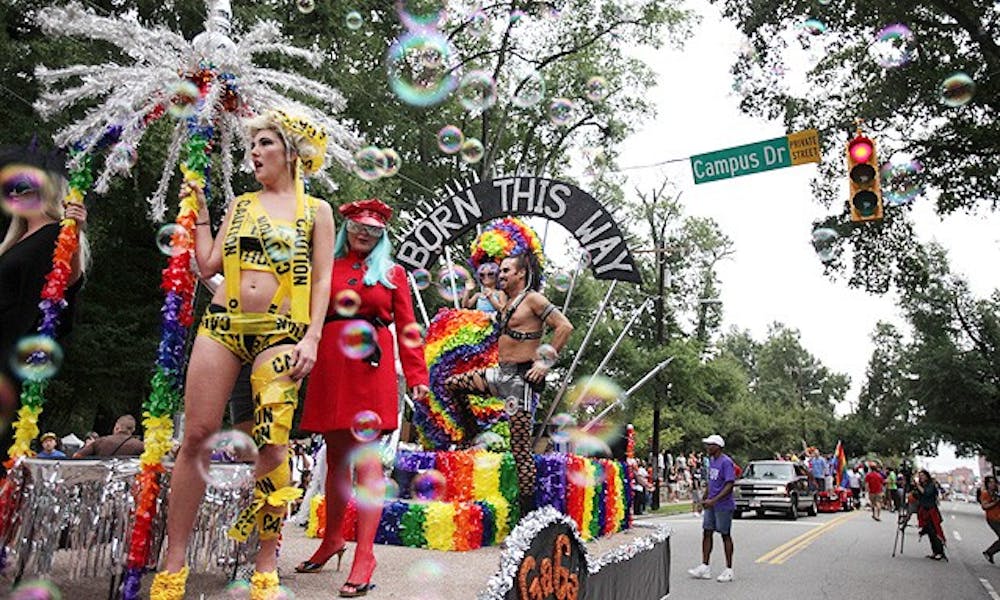The North Carolina Pride Parade was as much about political advocacy as the festivities this year.
The event, held annually by the Pride Committee of North Carolina, featured 14 floats, 88 registered groups and 1,050 registered parade participants marching from East Campus Gazebo to Ninth Street Saturday, said Joshua Allen, public relations coordinator for the Pride Committee, noting that this was record attendance for the parade. The attendees celebrated despite the rainy weather.
“It was the biggest success—we made everybody here today comfortable with who they are,” Allen said. “It sends a message to the community that it’s okay to be yourself and be out and proud.”
Along with costumed Lady Gagas and dogs in rainbow tutus, the celebration offered an opportunity to rally opposition against the Defense of Marriage Act. The measure was passed by the General Assembly Sept. 13. As a result, voters will vote on an amendment to the state constitution recognizing marriage only as a union between a man and a woman in the May 2012 primary election.
Parade volunteers offered opportunities for participants to register to vote in the May 2012 primary and express their stance on the amendment through their vote.
Al Parker of Raleigh, N.C., spearheaded the LGBT Center of Raleigh’s voting efforts in the hope of making voting more convenient. Although Parker said he is not encouraging voters to cast their ballot a certain way, he said he hopes registering more people at the event will increase the number of votes against the amendment.
Others involved in the voter registration drive actively encouraged new registrants to oppose the amendment with their vote.
“The opposition groups are thrilled to be taking our rights away. I will no longer be able to provide health insurance for my kid if this bill passes, and I don’t know why they’re joyed knowing this,” said Shawn Long, administrative coordinator for Equality N.C., a statewide advocacy group for gay rights.
He added that the amendment also poses an economic threat to the state.
“Companies such as Red Hat and Google came to North Carolina because they want to have equal benefits to their LGBT employees—this amendment will drive businesses away,” Long said.
Long also hoped to appeal to conservatives in the Tea Party and Libertarians, who he believes will disagree to any change to the state constitution.
President of Blue Devils United Ari Bar-Mashiah, a senior, said the turnout at Saturday’s parade—larger than in years passed—was perhaps due to opposition to the amendment.
“The May 2012 vote is a concrete threat, so the North Carolina LGBT community are more united than ever before,” Bar-Mashiah said. “This is our chance to show solidarity. There will be a strong push in the next few months, showing what it means for LGBT in North Carolina.”
Bar-Marshiah noted, however, that there is a strong turnout at the parade every year, with a growing number of Duke students in attendance.
“This is great—it means more and more Duke students are becoming comfortable with who they are,” he said.
Duke Homecoming Weekend, which coincided with the parade, brought alumni to the event as well.
“I recognized some guys on the Duke float,” senior Xin Xu said. “It was already a great turnout, and it felt pretty good to see some alums coming back to be on the float.”
Not everyone shared Xu’s opinion. Protestor Buddy Fisher of Hickory, N.C., criticized parade participants for supporting the gay community.
“Leave your sins and follow Jesus,” Fisher said.
Other protestors carried signs, one of which read: “People claim they know God, but they deny Him in the way they live.”
There was a smaller number of protestors this year, Allen said.
“I didn’t see that many protesters today—they feel like they’ve won,” said sophomore Patrick Oathout, who was assisting voter registration efforts. “We want them to feel like that because come May they won’t go out to vote if they’re feeling comforted.”
There was, however, one victory to celebrate, Allen said. The expiration of “don’t ask, don’t tell” Sept. 20 allowed LGBT members of the military to march in their uniforms Saturday.
“This is the first time service members are going to be able to march without being in fear of losing their jobs,” he said.
Get The Chronicle straight to your inbox
Signup for our weekly newsletter. Cancel at any time.

